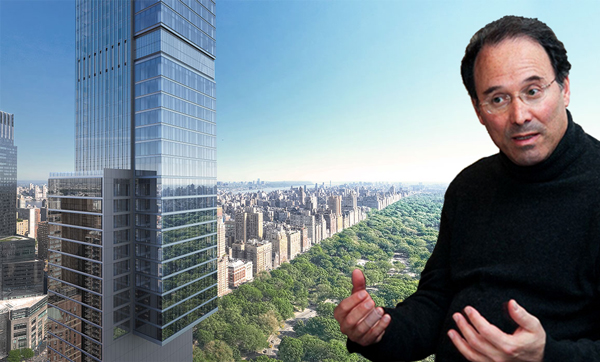In hindsight, the unpaid common charges were a red flag.
In December, the condo board at One57 [TRDataCustom], the ultra-luxury skyscraper on Billionaires’ Row, slapped the owner of a $50.9 million unit with a $64,331 bill for unpaid building fees. Six months later, the owner, Nigerian oil magnate Kola Aluko, was under investigation for alleged money laundering. In a rare move for a Manhattan condo, his lender moved to foreclose on the property.
Coupled with a series of unprofitable resales, the impending foreclosure — the second at One57 in as many months — has cast a shadow over the onetime poster child of the luxury residential boom. And it raises further questions about the health of Billionaires’ Row at a time when the tower’s developer, Gary Barnett, is planning an even more ambitious undertaking.
“It’s an isolated incident, but symptomatic of a bigger story,” said Leonard Steinberg, president of Compass. “Foreclosures used to be the domain of people who were barely scraping by. This shows it can apply as equally to the very wealthy.”
And there could be aftershocks.
“On the very high end of the market, where pricing has been knocked up again and again to the extreme, certain people will break,” Steinberg said.

Rendering of Extell’s Central Park Tower and Gary Barnett
This is particularly bad news for developers hawking new luxury product. That group includes Barnett, whose Extell Development is finalizing funding for Central Park Tower, a $4 billion condo project that seeks to eclipse even One57 in terms of ostentation and price tag. The 179-unit project at 217 West 57th Street, which recently received approval to launch sales, is the priciest in the city’s history.
“You have a nearby development from the same developer with a similar price point that’s got twice the number of units,” said Jonathan Miller, CEO of appraisal firm Miller Samuel. “The first building has a lot of units to sell and Billionaires’ Row is very quiet right now. Maybe that will change. But the scale of this and the fact that it took so long to shore up financing, it’s confusing to me what the lenders are thinking. It makes no sense.”
It’s like getting an awful stain on a gorgeous wedding dress.
A spokesperson for Extell said “these foreclosures are related to specific buyers’ personal financial circumstances and are atypical for this sector of the market.”
“One57 Set The Bar For Luxury On 57th Street,” the spokesperson continued. “Central Park Tower is expected to launch sales before the end of the year – and we are confident in the strength of the luxury market, especially along 57th Street where records continue to be broken.”
Hard times on the 79th floor
In many ways, One57 epitomizes the narrative of the current cycle. When it launched sales in 2011, it set a new threshold for what buyers were willing to pay for a Manhattan apartment. The building still holds the record for the priciest closed sale in the city, at $100.5 million, or about $9,200 per square foot. Barnett once referred to the view of Central Park from the upper floors of the tower as “the money shot.”
But as the market began to soften, One57 became one of its most glaring casualties. Some buyers looking for a quick profit instead took a beating. One investor paid $32 million, or north of $7,000 a foot, for a 32nd-floor pad, and right after closing on the unit relisted it for nearly $10 million more. After numerous price cuts and over a year on the market, it finally sold for $21.4 million, or less than $5,000 a foot.
Both Aluko and the owner of the other unit facing foreclosure, Sheri Izadpanah, had heavily leveraged their purchases. Izadpanah financed nearly 90 percent of the cost of her unit through a loan from a Canadian entity linked to Maurice Benisti’s Point Zero Capital. Aluko secured a $35.34 million mortgage from Banque Havilland, a Luxembourg-based institution, for his $50.9 million purchase in 2014.
“Usually those loans aren’t written today,” said Warburg Realty’s Jason Haber. “[As a lender], I want the buyer to have sizeable skin in the game.”

Kola Aluko
The negative optics of two foreclosures and unprofitable resales could take a toll on sales at One57, where Extell has only sold four units this year, brokers said. And after the developer listed 38 rental units for sale, prices are trending down.
“As a buyer, I know I have leverage,” said Platinum Properties’ Khashy Eyn, who had the listing for Izadpanah’s apartment.
“It’s like getting an awful stain on a gorgeous wedding dress,” Tyler Whitman, an agent at Triplemint, said of the situation with Aluko’s apartment. “Foreclosures happen — people fall on hard times and things go south. But for it to happen in a building like this is surprising. It’s become abundantly clear than One57 did not turn out to be the investment everyone wanted it to be.”
The foreclosures also serve as a referendum on “know your customer” policies. Developers risk the reputations of their buildings when they ink deals with questionable buyers. Examined under this light, the rigorous financial vetting by co-op boards at tony buildings such as 740 Park Avenue doesn’t seem so archaic, sources said.
“These co-ops are often much more diligent and efficient when it comes to vetting buyers,” said Douglas Elliman’s Frances Katzen. “They’re protecting the reputation of the building.”
Just how much demand exists for ultra-luxury condos has flummoxed developers and brokers over the past two years. The short answer: Not enough.
On 57th Street alone, World Wide Group and Rose Associates have cut prices and dangled broker incentives in an attempt to attract buyers at 252 East 57th Street, while JDS Development Group and Property Markets Group postponed sales at 111 West 57th Street last year.
“If the market were red-hot, people would be buying off plans, throwing checks down, and it’d be great,” PMG’s Kevin Maloney told Bloomberg at the time.
Ofer Yardeni, CEO of multifamily investment firm Stonehenge Partners, put it this way: “If real estate was a publicly traded company and I could short its stock, I would very happily short 57th Street,” he said in 2014. “The market there has stopped,” he said. “It hasn’t just declined 5 percent or 10 percent. It’s just stopped.”
Leap of faith
The one with the most to lose could be Barnett himself.
After more than 18 months of searching in a capital-arid environment, he’s finalizing a $900 million construction loan for Central Park Tower, a planned 1,550-foot tower just west of One57 at 217 West 57th Street, as The Real Deal first reported last week. While Barnett described the construction loan he was seeking for the project as being “very conservative,” penciling out to $1,800 a foot, it would still be one of the largest loans ever recorded for a residential project in New York.
But the troubles at One57 have some observers puzzled that Barnett and his peers would think of moving forward on new projects at this time.
One57’s foreclosures, said Town Residential CEO Andrew Heiberger, “are terrible news for all supertall towers looking to sell for more than $5,000 a foot.”
“We’re all surprised that there’s so much construction going on when the market has changed,” said Douglas Elliman’s Richard Steinberg. “It’s not a reflection on the developer, but it doesn’t bode well for the Billionaires’ Row marketplace to have foreclosures,” Katzen said. “It freaks people out and sends a message that there’s a bit less liquidity out there than everyone imagines.”
There are certainly projects out there that have managed to buck this trend. At Vornado Realty Trust’s 220 Central Park South, hedge funder Ken Griffin is reportedly in contract to pay over $200 million for a giant spread, while a Qatari buyer was said to be in talks in 2015 to pay an even greater sum for a multiple-unit spread at the building. And at 432 Park Avenue, even though Macklowe Properties and CIM Group have had to offer discounts on some pads, total closed sales are approaching $1.8 billion, according to an analysis by the Wall Street Journal. Though even those numbers come with a catch: For the priciest sale at 432 Park, for example, CIM provided the buyer, Saudi retail magnate Fawaz Al Hokair, with a $56 million money mortgage, which means that the developer only received a portion of the sales price at closing.
And Barnett has a history of doubling down when others are fleeing from the market.
In the depth of the recession, he convinced two Abu Dhabi–based government investment funds to put up a majority of the equity he needed to build One57. By the time the tower was ready, Barnett and his partners became among the first to benefit from the rip-roaring market in 2012 and 2013.
Some said Central Park Tower could follow the same arc, particularly if the market rebounds by the time Extell brings the condos to market.
“It’s probably five years out,” said Warburg Realty’s Frederick Peters. “Maybe we’re in a different market at that point. Usually the people who are brave enough when things look bad are the people who cash in when the market turns around.”
